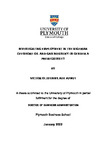INVESTIGATING EMPLOYMENT IN THE NIGERIAN OFFSHORE OIL AND GAS INDUSTRY: IS GENDER A PREREQUISITE?
| dc.contributor.supervisor | Wang, Yi | |
| dc.contributor.author | Apiafi, Victor Olufunmilade | |
| dc.contributor.other | Plymouth Business School | en_US |
| dc.date.accessioned | 2022-02-01T08:36:29Z | |
| dc.date.available | 2022-02-01T08:36:29Z | |
| dc.date.issued | 2022 | |
| dc.identifier | 362543 | en_US |
| dc.identifier.uri | http://hdl.handle.net/10026.1/18630 | |
| dc.description.abstract |
This study evaluates the factors influencing the inclusion of females into the Nigerian offshore industry. After extensive literature reviews, it is concluded that there is a shortage of females employed in this industry due to the patriarchal nature of Nigerian society. Evidently, the patriarchal nature of this country influences the rate of inclusion of females into the Nigerian offshore industry. Patriarchy in the Nigerian society also influences gender roles, male domination and gender discrimination, resulting in the limited inclusion of females into the Nigerian offshore industry. In Nigeria, the social conception of females as naturally incommensurate to males has given rise to an unreasonable social development of gender roles and male domination among males and females. As a result, males are prioritised with daily agendas in society, thereby dominating the commercial and bureaucratic environment. Meanwhile, females are relegated to the domestic scene, entailing primarily of non-essential activities that do not yield financial and political enablement. This study aimed to investigate and understand whether patriarchy has an influence on the shortage of females in the Nigerian offshore industry. Gender inequality has become an acute and persistent issue for global concern. Obviously, due to the expanding role that females perform in the community and the workplace, there is a crucial need to better perceive the inclusion of females in employment, especially in developing countries. This research argues that the shortage of females in the Nigerian offshore industry is due to the effect of patriarchy on gender roles, male domination and gender discrimination. Patriarchy is a traditional practice in Nigeria, resulting in a substantial negative impact on the inclusion of females' in the Nigerian workforce and the Nigerian economy. For this study, gender inequality is modelled as the limited inclusion of females into the Nigerian offshore industry. This research involved the researcher developing a theoretical framework underpinned by the liberal feminist theory, using the quantitative analysis methodology, the survey method, and primary data collected via a survey questionnaire. This study used a convenience sample size totalling 173 individuals, comprising 131 male and 43 female respondents employed in the Nigerian offshore industry. Finally, descriptive and parametric inferential statistics were adopted to analyse the survey data from this investigation. As the researcher is male, this research was steered with views from the liberal feminist perspective, and to avoid bias, the target population for this research were males and females employed in the Nigerian offshore industry. The individuals that participated in this research were sourced from labour groups and male and female organisations in the Nigerian offshore industry. The results of this research confirmed that gender is a prerequisite for employment in the Nigerian offshore industry, patriarchy does exist in the Nigerian offshore industry, and it is the primary factor for the shortage of females in this industry. The roles in the Nigerian offshore industry are not gender-neutral, resulting in gender discrimination. Gender discrimination and patriarchy do co-exist in the Nigerian offshore industry, and the liberal feminist theory is appropriate to address gender inequality in this industry. | en_US |
| dc.language.iso | en | |
| dc.publisher | University of Plymouth | |
| dc.subject | Gender Studies | en_US |
| dc.subject.classification | Other (e.g., MD, EdD, DBA, DClinPsy) | en_US |
| dc.title | INVESTIGATING EMPLOYMENT IN THE NIGERIAN OFFSHORE OIL AND GAS INDUSTRY: IS GENDER A PREREQUISITE? | en_US |
| dc.type | Thesis | |
| plymouth.version | publishable | en_US |
| dc.identifier.doi | http://dx.doi.org/10.24382/477 | |
| dc.identifier.doi | http://dx.doi.org/10.24382/477 | |
| dc.rights.embargoperiod | No embargo | en_US |
| dc.type.qualification | Doctorate | en_US |
| rioxxterms.version | NA |
Files in this item
This item appears in the following Collection(s)
-
01 Research Theses Main Collection
Research Theses Main


